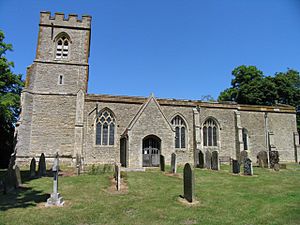St Lawrence's Church, Broughton facts for kids
Quick facts for kids St Lawrence's Church, Broughton |
|
|---|---|

St Lawrence's Church, Broughton, from the south
|
|
| Lua error in Module:Location_map at line 420: attempt to index field 'wikibase' (a nil value). | |
| OS grid reference | SP 894 401 |
| Location | Broughton, Milton Keynes, Buckinghamshire |
| Country | England |
| Denomination | Anglican |
| Website | Churches Conservation Trust |
| History | |
| Dedication | Saint Lawrence |
| Architecture | |
| Functional status | Redundant |
| Heritage designation | Grade I |
| Designated | 17 November 1966 |
| Architectural type | Church |
| Style | Gothic |
St Lawrence's Church is an old Anglican church located in Broughton, a part of Milton Keynes, Buckinghamshire, England. It's no longer used for regular church services. This church is very special. It is listed as a Grade I building. This means it's considered a very important historical site. The Churches Conservation Trust looks after it. The church is famous for its amazing medieval wall paintings. These paintings are hundreds of years old.
Contents
History of St Lawrence's Church
The church was first built a very long time ago. Most of it was constructed in the 14th and 15th centuries. That's between the years 1300 and 1499.
Discovering the Wall Paintings
In the 19th century, the church was repaired and updated. This is called a Victorian restoration. During this time, the chancel (the part of the church near the altar) was rebuilt.
In 1849, something amazing was found. Workers discovered a series of old wall paintings. These paintings had been hidden under plaster for about 300 years! They were from the medieval period.
Later, in the 1930s, a expert named Professor Tristram helped restore these paintings. This made them clear and visible again. On August 1, 1987, the church officially became cared for by the Churches Conservation Trust.
Architecture of the Church
St Lawrence's Church is built from stone. Its roofs are made of lead. The church has flat walls at the top, called parapets.
Outside the Church
The church has a simple layout. It has a main hall called a nave. This nave does not have side aisles. There is a porch on the south side. It also has a chancel at the east end. At the west end, there is a tower.
The tower has three levels. It has strong supports called buttresses. The top of the tower has a battlement design. On the south side of the church, there are three windows. Each window has three sections.
Near the porch, there is a window from the 14th century. It has a special pattern called tracery. East of the porch, there are two windows in the Perpendicular style. On the north side, you can see a staircase. This staircase once led to a rood loft.
Inside the Church
The most exciting part of St Lawrence's Church is inside. The nave has many wall paintings. These paintings are from around the year 1400.
Famous Wall Paintings
On the south wall, you can see a painting of Saint George fighting the dragon. Sadly, Saint George's head was lost. This happened in the 15th century when the ceiling was made lower.
On the north wall, there are two important paintings. One is a doom painting. This type of painting shows the Last Judgment. The other is a Pietà. This shows Mary holding Jesus after his crucifixion. These paintings were meant to warn people against swearing.
You can also find paintings of other saints. These include Saint Helena and Saint Eligius.
Other Features Inside
The pulpit (where the priest gives sermons) is quite old. It dates from the late 17th or early 18th century. There are also old memorials. These include black marble stones under the altar. You can also see small pieces of brass from the 14th and 15th centuries. A wall monument from the 17th century is also present.
The church has beautiful stained glass windows. The windows in the east and south of the chancel were made by Charles Eamer Kempe in 1894. Another window in the nave was made by A. Gibbs in 1864.
The church has a set of four bells. However, they cannot be rung anymore. The two oldest bells were made around 1470. The other bells were made in 1622 and 1655.
See also
 | Percy Lavon Julian |
 | Katherine Johnson |
 | George Washington Carver |
 | Annie Easley |

